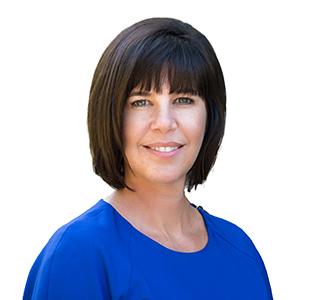A cancer diagnosis can seem to change everything — and all too often, intimate relationships are affected by the stress and strain.
Clinicians in City of Hope’s Department of Supportive Care Medicine had just this issue in their sights when they created the one-of-a-kind Couples Coping With Cancer Together Program. It provides psychological support to patients in the Women’s Cancers Program and their partners, free of charge. Highly rated by those who benefit, the program has proved successful, both in keeping couples connected and enhancing the quality of care.
According to Courtney Bitz, L.C.S.W., M.S.W., director of clinical social work, one invaluable element is the way that the program is coordinated with medical care.
“It’s very much integrated,” she said. “When an individual is diagnosed with cancer, it is incredibly important that the couple is activated as a team and encouraged to focus on the strengths of their relationship. Activating their ability to work together and emotionally support one another is crucial for patients to get the best out of their medical care.”
Help right from the start
The lynchpin of the couples program is an introductory 30-minute consultation currently offered to every patient in the Women’s Cancers Program who has an intimate partner, along with that partner.
During the meeting, a specially trained social worker provides practical guidance for coping, drawn from research, the things that have worked for other couples and the clinician’s own experience. Couples are encouraged to acknowledge and make the most of each person’s disparate strengths, keep lines of communication open and problem solve as a team.
Importantly, this session happens as an essential part of the first doctor’s visit.
“Doing the psychoeducational intervention first has been magical,” said Kim Romig, L.C.S.W., ACHP-SW, a clinical social worker with the couples program. “We de-escalate their anxiety. The patient and partner can then make the best of their visit with the physician and focus on medical information.”
With a focus on diverse patients’ needs, the couples program offers services in Spanish as well, conveying information in a way that’s respectful and culturally relevant.
“I’m very proud to facilitate this type of service,” said clinical social worker Claudia Cuevas, M.S.W. “It’s our way of providing great support for a minority population that already has so many other challenges to face when accessing medical care.”
More depth, more reach
A patient and partner can also choose to participate in two to three couples counseling sessions, as well as a monthly support group (now virtual). Both are grounded in the same strengths-based approach as the initial session.
Rather than duplicating services that exist in the community, counseling focuses on issues raised by a couple’s experiences with cancer. The sessions are oriented toward what’s happening in the here-and-now instead of revisiting problems from months or years previous. A guiding question: Looking back, will you be proud of yourself in this moment?
“Sometimes, cancer really walks through people’s doors in such a way that they’re not functioning as a couple as they used to,” Romig said. “We go into more depth about their goals and explore the dynamics between them and ways they can start living the relationship they always wanted.”
The support group is open to all patients, regardless of diagnosis. Two of the program’s clinicians facilitate each session, introducing themes based on concerns that patients and their partners submit at the beginning of each session.
“These couples are vulnerable, open and so supportive of one another,” Bitz said. “We often hear from participants that they have never had conversations like these with their partner, and these conversations are extremely helpful and healing.”
City of Hope doesn’t stop for COVID-19
Even as the pandemic has upset everyday life, the services offered through the couples program have continued uninterrupted. Initial consultations now happen over the phone, with couples counseling and support group sessions occurring via video chat.
That ability to pivot has enabled the couples program to thrive in recent months. The nimble move to telehealth helps remove obstacles that previously prevented partners from visiting the Duarte campus. Between that advantage and the ability to see out-of-state couples, the program now serves more people than ever.
“Telehealth is now a household word in the Latino community,” Cuevas said. “In my conversations with Spanish-speaking patients and partners, I’ve found that working this way creates a positive energy, to be more proactive in other areas.”
A potential international model for care
The couples program has reached thousands of patients and partners since a philanthropic gift enabled its launch as a comprehensive program in 2014.
Growth has come in part from word of mouth among physicians pleased by the support it provides patients and their partners. Surveys of patients and spouses show satisfaction in the range of 93-98% across a number of measures — with higher scores among partners.
The program has begun expanding to City of Hope patients with gastrointestinal and lung cancers, along with their partners. The clinicians involved aim for another type of expansion — peer institutions building similar programs. To this end, they’ve published about their model for care in peer-reviewed scientific journals.
“We didn’t just take what we learned and keep it at City of Hope,” Bitz said. “Our team is committed to sharing with other institutions nationally and internationally. The more couples who benefit, the better.”

